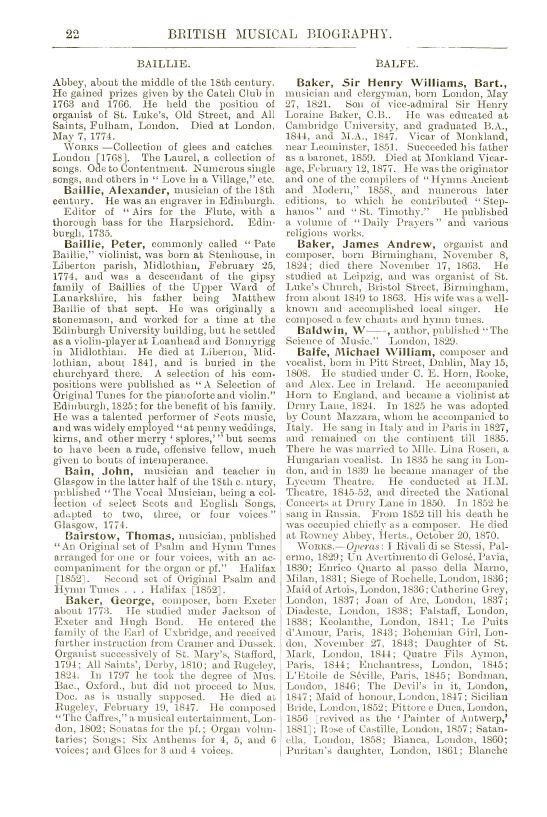- Balfe, Michael William
[E] Balfe, Michael William, composer and
vocalist, burn in Pitt Street, Dublin, May 15,
1808. He studied under C. E. Horn, Rooke,
and Alex. Lee in Ireland. He accompanied
Horn to England, and became a violinist at>
Drury Lane, 1824. In 1825 he was adopted
by Count Mazzara, whom he accompanied to
Italy. He sang in Italy and in Paris in 1827,
and remained on the continent till 1835.
There he was married to Mlle. Lina Rosen, a
Hungarian vocalist. In 1835 he sang in Lon-
don, and in 1839 he became manager of the
Lyceum Theatre. He conducted at H.M.
Theatre, 1845-52, and directed the National
Concerts at Drury Lane in 1850. In 1852 he
sang in Russia. From 1852 till his death he
was occupied chiefly as a composer. He died
at Rowney Abbey, Herts., October 20, 1870.[W] Works. — Operas: I Rivali di se Stessi, Pal-
ermo, 1829 ; Un Avertimento di Gelos^, Pavia,
1830; Enrico Quarto al passo della Marno,
Milan, 1831 ; Siege of Rochelle, London, 1836;
Maid of Artois, London, 1836 ; Catherine Grey,
London, 1837; Joan of Arc, London, 1837;
Diadeste, London, 1838; Falstaff, London,
1838; Keolanthe, London, 1841; Le Puits
d'Amour, Paris, 1843; Bohemian Girl, Lon-
don, November 27, 1843; Daughter of St.
Mark, London, 1844; Quatre Fils Aymon,
Paris, 1844; Enchantress, London, 1845;
L'Etoile de Seville, Paris, 1845; Bondman,.
London, 1846; The Devil's in it, London,
1847; Maid of honour, London, 1847; Sicilian
Bride, London, 1852 ; Pittore e Duca, London,
1856 [revived as the ' Painter of Antwerp,'
1881]; Rose of Castille, London, 1857; Satan-
ella, London, 1858; Bianca, London, 1860;
Puritan's daughter, London, 1861 ; Blanche
de Nevers, London, 1862 ; Armourer of Nantes,
London, 1863; Sleeping Queen, London, 1863 ;
II Talismano, London, June 11, 1874. Can-
tatas : Mazeppa, London ; The Page, etc. Six
new songs and a duet (words by Longfellow),
1856. Moore's Irish melodies, harmonized
1859 (Novello). Part-songs: Eselsior; Hark!
'tis the hunter's jovial horn; Trust her not,
etc. Songs and ballads : Angels call me ; Annie
of Tharaw ; Arrow and the song ; As the sun-
shine to the flower ; Ah ! would that I could
love thee less ; Anabel Lee ; Bells ; Beneath a
portal ; Bridal Ballad ; Come into the garden,
Maud; Daybreak; Defence, not defiance;
Evening chime is sounding; Fortune at her
wheel ; Fresh as a rose ; Good-night, beloved ;
Green trees whispered ; Hidden voices ; I love
you ; Kathleen Machree ; Killarney ; Lady Hil-
dred ; Long ago ; Lonelj- Rose ; Maggie's Ran-
som; Maureen; Merry May; Nelly Gray;
Phoebe, the fair ; Sea hath its pearls ; Stars of
the summer night ; Spirit of light ; There is a
shadow ; Three fishers ; What does little birdie
say; and verj- many more. Trio for pf., violin,
and 'cello; Sonata pf. and 'cello; and other in-
strmiiental works. New universal method of
singing without the use of solfeggi, London.
The only opera of Balfe's which now survives
is the "Bohe:nian Girl," which continues to
draw good audiences wherever produced.
This opera and a few of his songs, "Killarney "
and "Come into the garden, Maud," are all
that have lived out of an immense number of
able productions. Two biographies of Balfe
have been pubUshed — "A Memoir of Michael
William Balfe," by Charles Lamb Kenney,
London, 1875; and "Balfe, his life and work,"
by W. A. Barrett, London, 1882.[+] His wife, Lina Rosen (born in Hungary,
1806; died London, .June 11, 1888), was a sop-
rano vocalist of considerable abilitj'.entry id: 22-R-26

page 22 - view at internet archive
